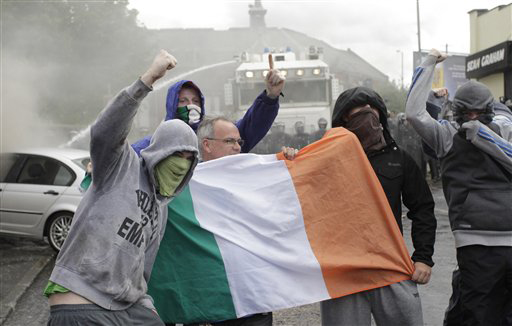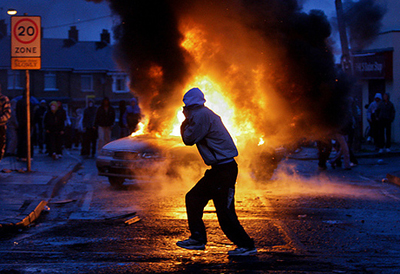Northern Ireland Assembly to receive policy recommendations
 Young people rioting in Northern Ireland
Young people rioting in Northern Ireland
Tue, 03 Jun 2014 15:45:00 BST
Northern Ireland “Culture Wars” Symposium says says young people need a safe place to air their grievances
YOUNG people from disadvantaged communities in Northern Ireland should be provided with “safe spaces” in which to protest and make their views known. This would help prevent them falling under the sway of extremists, argue researchers at the University of Huddersfield who played a major role in organising a conference in Belfast that investigated the “culture wars” of Ulster.
One of the key themes to emerge was that many working-class communities felt they had gained little from the province’s “peace dividend”, with jobs hard to find and segregation still common. As a result, there is a danger of paramilitary groups and criminals exploiting grievances, particularly among the young.
 “Culture Wars” Symposium
“Culture Wars” Symposium
A report of the event – which was entitled The Northern Ireland “Culture Wars” Symposium – has now been published and it includes policy recommendations. Chief among them is the suggestion that the Northern Ireland Executive should immediately devise a strategy to address the needs of the region’s most deprived communities.
“This should focus on young people, particularly improving socio-economic opportunities and the provision of safe spaces for the youth to express their opinions, aspirations and grievances,” state the report’s authors, the University of Huddersfield’s Dr Shaun McDaid, Dr Andrew Mycock, Dr Catherine McGlynn and Professor Jim McAuley, with Dr Cathy Gormley-Heenan of the University of Ulster.
The Huddersfield team are members of the University’s Centre for Research in the Social Sciences, and they also head up the Political Studies Association’s Britishness Specialist Group, which co-organised the Belfast symposium.
Key themes
 Commenting on the symposium and the report, Dr McDaid (pictured left) – whose publications include the 2013 book Template for Peace: Northern Ireland, 1972-75 - said that one of the key themes that emerged was the problem of young people in disadvantaged communities. “Despite 15 or so years of the peace process, their life chances have not, in fact, improved that much. Young people from both the Republican and Loyalist communities are finding it difficult to secure any of the benefits that the rest of the region has experienced.”
Commenting on the symposium and the report, Dr McDaid (pictured left) – whose publications include the 2013 book Template for Peace: Northern Ireland, 1972-75 - said that one of the key themes that emerged was the problem of young people in disadvantaged communities. “Despite 15 or so years of the peace process, their life chances have not, in fact, improved that much. Young people from both the Republican and Loyalist communities are finding it difficult to secure any of the benefits that the rest of the region has experienced.”
The danger is that these grievances could be manipulated by sinister forces, added Dr McDaid.
“Young people could be led into forms of protest that worsen their life chances still further, if they get convicted of an offence for example.”
These fears led the symposium to develop the idea of a safe space, where young people would be free from potential manipulation by other forces within the community, continued Dr McDaid.
“They would be provided with a forum to express their views and where they would have access to civil society groups and policy makers in order to put their points across without the risk of being sucked into violent street action.”
The report also urges policy makers to ensure equality of citizenship and legal protections for various minority groups within Northern Ireland, as well as developing a racial equality strategy as a matter of urgency.
The symposium and the report have used the concept of ‘culture wars’ as a framework for understanding how debates about social, cultural, and political change have shaped the agenda in Northern Ireland and other western societies, particularly the United States.
“Whilst in Northern Ireland, debates about culture and identity continue to be shaped by the legacy of past conflict, an equally divisive ‘culture war’ concerning social and moral issues is emerging in the region,” explained Dr McDaid.
“Issues such as marriage equality and reproductive rights feature prominently in these often divisive public debates. The key divisions here are not between British unionists and Irish nationalists, but rather those between of liberal/progressive and traditional/conservative backgrounds – divisions which often cross traditional ethnic and sectarian groups”.
The symposium report – which can be accessed at http://eprints.hud.ac.uk/19896/ - has been widely distributed to policymakers, including members of the Northern Ireland Assembly representing all shades of political opinion, as well as prominent civil society organisations in the region. A proposal for a special issue of a peer-reviewed journal based on the ‘culture wars’ theme is currently under review.







